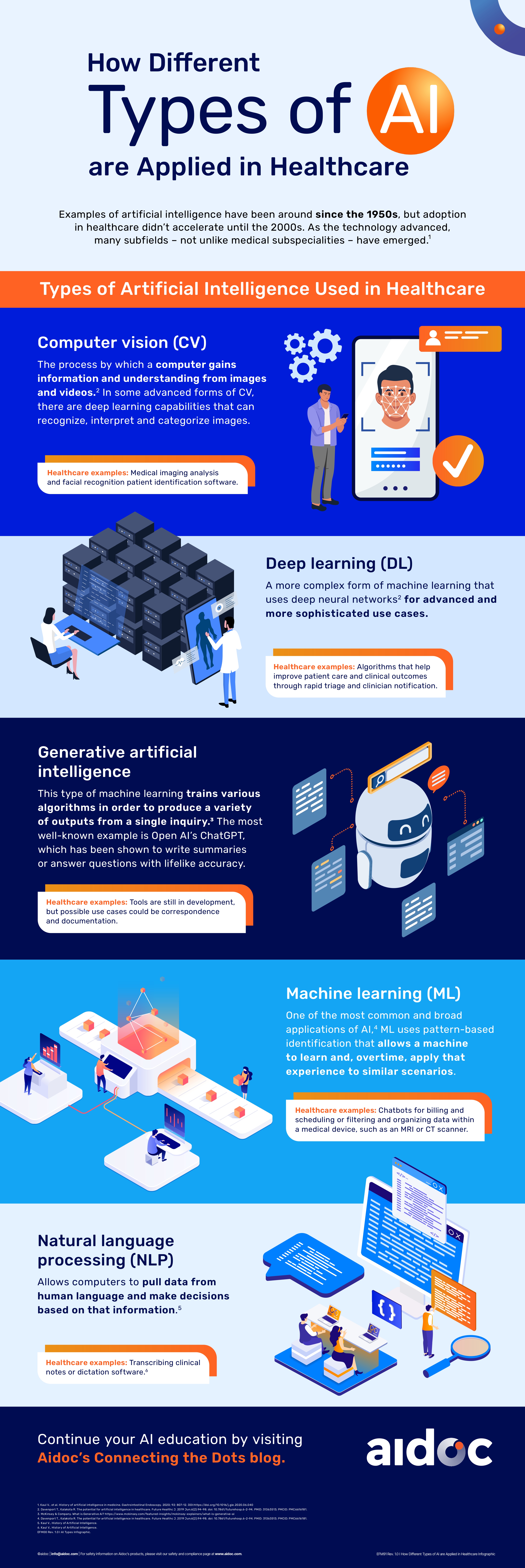There is a gamut of options of AI healthcare companies aiming to impact the future of clinical care. As the technology gains popularity and is embedded in more clinical workflows, its ability to impact triage and even clinical outcomes becomes more evident.
With such an influx of options to choose from and new terminologies to become acquainted with, we’ve compiled a list of questions that are helpful to ask yourself (and prospective AI partners) when starting on your journey.
What Is the Medical AI Company Landscape Like?
There seems to be an overabundance of options when it comes to healthcare AI companies, each promising their own unique set of benefits and workflow improvements. It’s important to note that when referring to “health AI companies,” it can include AI tailored to suit the needs of a variety of subspecialties, including:
- Conversational AI/Bots
- Surgical robotics
- Cybersecurity
- Fintech and Insurance
- Text analysis
- Diagnostics
For more information on the types of AI applied in the medical domain, view the infographic below:
Within AI is a major promise to health systems: the possibility to expedite clinical workflows and, downstream, effectuate a positive impact on patient outcomes. To bring that promise to fruition, it is essential that health systems outline why AI is right for them and what metrics they’d like to be impacted by AI adoption. That should be their proverbial north star when choosing how AI is used in their health system. Here are a few examples:
Optimizing Radiology Workflows
Since radiologists sit at the center of many clinical AI activities, the field has served as a testing ground for how an AI-enabled read room can bring downstream value to patients and health systems in several different ways:
- Faster analysis and prioritization of scans, leading to quicker diagnosis
- Increased sensitivity and specificity, leading to better accuracy
- Improved workflow and reading time, translating to quicker throughput
- Discovery of incidental findings, leading to more clinically-appropriate interventions
Reducing Time to Diagnosis
Decreasing read time is not only a workflow efficiency improvement, but could also reduce radiologists’ burnout. Clinically integrated AI extracts key information form radiology reports, which has been proven to have a positive impact on read times and can help address ongoing challenges with radiologist shortages and increasing imaging volume.
Improved Turnaround Time
Staffing shortages – within radiologist and other clinical departments – have further illustrated the need for accurate and timely information that can lead to immediate, collective action. AI-supported triage has been proven to optimize patient care, such as reducing report turnaround time, improving emergency department throughput and improving time to treatment.
What Should I Consider When Choosing an AI Partner?
Health systems should exert the utmost scrutiny when assessing their next step in their AI journey, which starts and ends with the quality of their relationship with their AI partner. While there is a host of questions and conversations that should be tailored to a health system’s needs, here are three questions that should be at top of mind when you assess AI medical companies:
- Market Traction: Does the company have a proven track record of algorithms thriving “in the wild?” The actual deployment of their solutions ought to be developed on an established use-case basis.
- A Comprehensive Roadmap: AI is constantly evolving. An established medical AI company should have a roadmap of future modalities.
- Seamless System Integration: Only when AI is deployed at scale can its value be properly actualized and assessed. This is possible with an enterprise-wide platform that connects multiple service lines and systems into a seamless end-user experience.
What Should IT Consider When Assessing Healthcare AI Companies?
You have outlined use cases at your facility and figured out what to consider at a high level when assessing AI vendors, now it’s time to get to your IT considerations. The following questions will give you a sense of how capable an AI vendor is at delivering on all the promises of healthcare AI:
- How does your system automatically match algorithms to potential findings?
- Can suspected positive findings be relayed in real time to all relevant stakeholders across departments and in spoke facilities?
- Is AI monitored 24/7 for performance and data drift, and how does your company address this proactively?
Healthcare AI Companies Moving Forward
As you can see, there is a lot to consider when assessing the validity of claims made by healthcare AI companies, and utmost scrutiny is required to find the right fit for your health system. By considering the main use cases and data sets you’d like to measure in a “Before and After AI” scenario, key considerations for your AI partner and IT needs, you are getting your health system’s AI journey started on the right foot. Healthcare AI experts are predicting near-term consolidation as the technology proliferates across health systems and becomes further entrenched in clinical workflows. This means that a platform approach is more likely to gain steam as healthcare executives become more serious about forming long-lasting AI strategies.
To stay in the know of current clinical AI trends and expert-driven insights, be sure to explore Aidoc’s AI Learning Center, offering 400+ pieces of content to drive your AI education.





